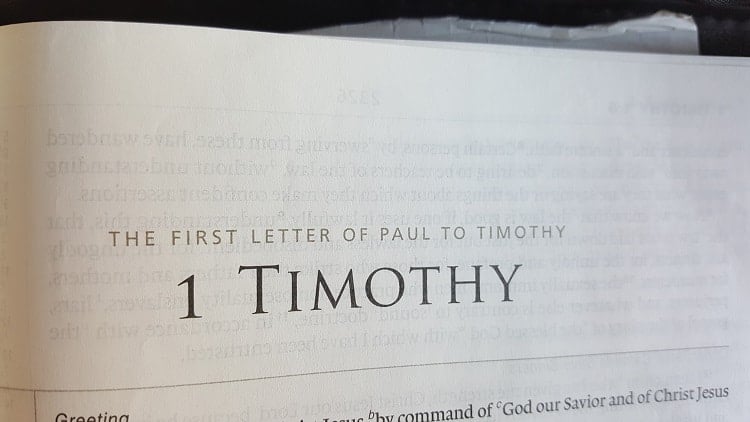⏱️ Estimated Reading Time: 6 min read
Recently, my wife and I bought a gazebo to put outside our house. Unfortunately, it came in one of those boxes that says, “Some assembly required.” Knowing my limitations with being handy, I had hoped it would come just as it looked set up in the store! I have yet to open the box, but when I do, I hope to find instructions there that will be clear enough for this dense assemblyman, that I can pass it off to my two sons to put together!
The book of 1 Timothy is a spiritual father talking to a spiritual son, and the message given to the son, to some extent, centers around passing along the right instructions, the right doctrine, the right gospel. Chapter 1 begins with the reminder that Paul left Timothy in Ephesus to confront wrong doctrine and its teachers. In chapter 4, Paul tells Timothy of the importance of being devoted to the public reading of Scripture, and the urgent need to keep a close watch on himself and the teaching or doctrine. In chapter 6, Paul again urges Timothy to teach these things and warns of those who would teach a different doctrine. While there are some other issues that Paul brings up in this letter, it would seem that there is a significant emphasis on keeping and teaching right doctrine. Paul desires Timothy to understand how truth is consistent with and built on a biblically faithful understanding of the gospel. Indeed this is essential if Timothy is to be faithful to teach these things to the brothers, for in doing so, he will be “a good servant of Christ Jesus, trained in the words of the faith and of the good doctrine that you have followed” (1 Timothy 4:6).
One might question if doctrine is all that important. Isn’t it important to just revel in the truth of the gospel? There is certainly a need for God’s people to remember the simple truth of the gospel, but there is a danger is we are not careful to guard the right teaching, the right doctrine as spelled out in Scripture. The verses we will consider in this article, 1 Timothy 1:18-20, give us a real-life example that shows the importance of staying faithful to the doctrine. In these verses, Paul sets out a clear contrast, life vs. death situation involving one who keeps the faith, follows after the doctrine of truth, vs. one who swerves from the truth and ends in a very dangerous position.
Now a simple way to state this is to say that one ought to choose to believe right doctrine and not swerve from it, thereby avoiding the shipwreck that comes from those who stray. The language Paul uses demonstrates that this is anything but a natural choice. Rather it is a battle that we are urged to fight. The fact that it is a fight is seen in how Paul first addresses Timothy in vs. 18. He is giving, entrusting a charge with him.
I have been to ordination councils and services that follow, and normally there is a “charge” that is given to the candidate, and a subsequent “charge” is given to the church where the candidate serves. The idea is that this is a motivating speech, just as the soldier heads off into battle or the football player takes the field. You give a “charge” to someone who is headed for adverse circumstances, yet will be expected to hold firm. So, Paul sets the table for these words, getting us ready for the battle, for the game of life and death.
We further see that Paul states that based on the previous evidence of grace in Timothy’s life and the affirmation of his “ordination council,” he is to “wage the good warfare.” If we missed the concept in the charge, Paul makes clear that the life of a disciple takes place on the field of battle. We are called to wage the real warfare by way of holding faith and a good conscience.
We can often reduce solid doctrine as the fruit of a diligent, if not rigorous study of the Bible. Perhaps we might think that once through Seminary or Bible College or even faithful attendance at church and small group, we will possess the solid doctrine upon which to stand. Church and theological training are excellent and highly recommended, but the war zone does not end at the door of the Seminary or the steeple of your local church. In fact, quite often those who are the most learned scholars in theology are the most susceptible to divergent beliefs. We must remember that each day is a battle, a war for our hearts, and we must faithfully engage in the battle with the strength of the Lord.
The danger zone of all this is the message of vs. 20 that some have swerved from the truth of the gospel, the doctrine of truth with the result of a shipwrecked faith. Whether this was written before or after Paul’s shipwreck in Acts 28 is uncertain, but what is certain that to be shipwrecked meant your life had come to an end. This is the sense that the sailors in Paul’s boat had as they thought their time had come, and only the words of Paul and works of God protecting Paul saved the sailors as well.
In the same way, we must not take lightly the image that Paul is drawing for us here: a shipwrecked faith is a faith that has come to its end, in a life-ending, or in this case, a spiritual, life-ending way. It is of such a severe end, that Paul warns Timothy, with the idea that Timothy would further warn the false teachers, that they were in grave, spiritual danger. So grave is this danger, which Paul tells us that he has handed these two, Hymenaeus and Alexander, over to Satan, so that they might change the direction of their blasphemous teaching. It is similar language to that which is used about church discipline. Church discipline is the practice of biblical churches whereby individual professed believers are excluded from the fellowship in order to restore their faith. It is meant to picture what eternal life apart from God might look like and invite the erring one back to faith. Paul reminds us here of the seriousness of this swerving and its inevitable end, without the true repentance of those involved.




